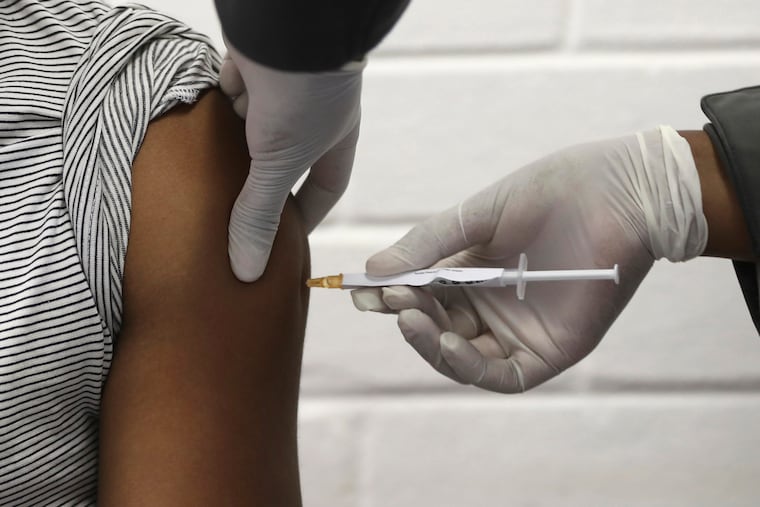Philly kids and adults are skipping routine immunizations, even as search for COVID-19 vaccine goes on
Children and adults have fallen behind schedule for routine yet critical immunizations while they were quarantined at home, sparking concern for potential outbreaks of vaccine-preventable illnesses.

In Philadelphia, there has been a significant drop in the number of pediatric and adult routine immunizations administered since the beginning of the coronavirus pandemic, compared with the same time last year, according to the city’s Public Health Department.
The Philadelphia Immunization Program, part of the city’s health department, maintains a registry of all immunizations that residents receive.
“For children between the ages of 0 to 1, we’ve seen a 40% drop in the number of immunizations administered since March,” said Amber Tirmal, the program’s manager. “For children between the ages of 0 to 2, we’ve seen a 50% drop, and for all other age ranges in children, we’ve seen a 70% drop in the number.”
All told, 184,782 immunizations were given to kids between March 18 and June 16, 2019. But only 95,712 immunizations were given to kids in the same period this year.
Routine adult immunizations are also down. Between March 18 and June 16, 2019, about 81,155 vaccinations were given to adults in Philadelphia, compared with 21,315 in the same period this year.
There’s good and bad news in those numbers, public health officials say.
“The data we’re seeing show people really listened to the stay-at-home order, and were taking the pandemic seriously,” Tirmal said. “However, as a result, routine immunizations really suffered. We don’t want to see outbreaks of vaccine-preventable diseases at the same time.”
Diseases such as measles and mumps are a particular concern.
“Even small drops in vaccination levels have the potential to set the stage for disease transmission,” said Neal Goldstein, an assistant research professor of epidemiology at the Drexel University Dornsife School of Public Health.
» READ MORE: Bethlehem firm’s spit test for COVID-19 is coming closer
Physician offices and other clinical settings have reopened for such routine care as vaccines, and are taking steps to make sure social distancing and mask orders are being observed.
Olivia Dimmig, a public-health nurse at Chester County Health Department, said her daughter received her 6-month vaccines at the start of the pandemic, and her 9-month vaccines on time.
“I was pleasantly surprised at her 6-month visit with the precautions our pediatrician’s office was taking, and I felt good about taking her in for her 9-month vaccines.” Dimmig said. “I know from my professional experience that if she missed her vaccines, we’d be playing catch-up. Even though the pandemic is all the buzz, these other threatening illnesses haven’t gone away.”
Though there’s some uncertainty about the fall, school immunization requirements have not changed.
“Years and years of work has gone into place to make these childhood illnesses preventable. It would be a shame if these illnesses were to pop up again,” Dimmig said. “If my daughter were going into day care or was a school-age kid, I would be concerned about the immunization status of other kids she would come into contact with.”
With the drastic drop in routine immunizations, families and their pediatricians need to catch up as soon as possible.
» READ MORE: Children’s ‘polio-like’ illness may return in August. But a new treatment will cost millions to test.
“Practices are seeing patients now, trying to catch up people on their immunizations,” said Amy Wishner, program director of the Pennsylvania Immunization Coalition. “Every vaccine protects serious diseases with bad complications. They are all important, and important at the ages which they are recommended.”
Adults need immunizations, too, especially because immune systems weaken over time. Adults should get a flu vaccine every year, and a Tdap (Tetanus, diphtheria, and pertussis) booster every 10 years. Pneumococcal vaccines are also recommended for adults to prevent against such serious diseases as meningitis.
Health experts are especially concerned about what could happen in the fall if the coronavirus pandemic is made worse by seasonal flu and other diseases that vaccines can avert.
“We need to put planning for the flu and measles into planning for the pandemic — they can’t be separate,” said Arthur Caplan, professor of bioethics at the New York University Department of Population Health.
Caplan added that part of this planning involves preparing hospitals for a big rush of patients, ensuring that there are no financial obstacles in the way of getting immunizations, and making sure that testing for coronavirus, measles, and other diseases is available so cases can be isolated and quarantined.
“Everyone needs to participate in the vaccination efforts. This is the year to tell people to get a flu shot,” Caplan said. “All of these get missed if we’re not doing regular doctor visits.”
» HELP US REPORT: Are you a health care worker, medical provider, government worker, patient, frontline worker or other expert? We want to hear from you.
Immunization facts
Recommended vaccine schedules can be found on the U.S. Centers for Disease Control and Prevention’s website.
If you missed a scheduled dose, there is no need to restart a vaccine series no matter how much time has passed between doses.
The CDC has created guidelines for catch-up immunization schedules and minimum intervals between vaccine doses to assist health-care providers and families who have been delayed in receiving a dose.
The Vaccines for Children (VFC) program provides free vaccines to children who qualify. About half of American children under age 19 receive VFC vaccines.